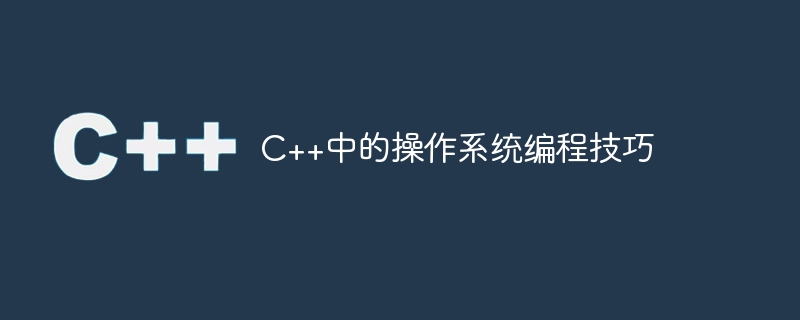Home >Backend Development >C++ >Operating system programming skills in C++
Operating system programming skills in C++
- 王林Original
- 2023-08-22 15:28:451067browse

Programming the operating system in C requires mastering some skills and methods, as described below:
1. The foundation of the operating system
- Basic concept: The operating system is the core component of the computer system. It is responsible for managing and allocating computer hardware resources, such as CPU, memory, disk, network and other resources, and providing system call interfaces for application calls.
- Architecture: Common operating system architectures include monolithic structure, grouped structure and microkernel structure.
- Process management: A process is a program running in the computer. The management of processes in the operating system is very important, including process creation, scheduling, synchronization and inter-process communication.
- Memory management: Memory management is one of the most important components of the operating system. It involves memory allocation between the process and the operating system, virtual memory management and protection, etc.
- File system: The operating system is also responsible for file system management, including file creation, access, modification and deletion.
2. Operating system programming skills
- Familiar with system calls: System calls are the interfaces provided by the operating system to application programs. The operating system provides various system calls to meet The needs of the application, such as input and output, file operations, process scheduling, etc. Making system calls in C requires using the API (application programming interface) or library functions provided by the operating system.
- Learn assembly language: Assembly language is an important foundation for understanding hardware design and underlying operations of the operating system. Learning assembly language can help us better understand the internal structure and operating mechanism of the operating system.
- Use memory mapping: Memory mapping can map files into memory so that applications can directly access files in memory without performing IO operations. Memory mapping can be implemented in C using the mmap() system call.
- Study multi-threaded programming: Multi-threaded programming is an important part of the operating system and can significantly improve system resource utilization and program performance. Multi-threaded programming can be implemented in C using the POSIX thread library.
- Control system calls: System calls are the interface between the operating system and the application program. The behavior of the application program can be controlled by tampering with the system call table. System calls can be controlled in C using the LD_PRELOAD technique.
3. Practical cases
- Memory allocator writing: In operating system programming, writing your own memory allocator is essential, and it can involve the memory pool. , object pool, scalable memory allocator and other technologies.
- Concurrent programming practice: For concurrent programming in C, you can use the POSIX thread library or the multi-threaded API in the C 11 standard, which can implement various concurrent programming practices, such as producer-consumer problems, read-write locks, etc. .
- Operating system vulnerability mining: In operating system programming, it is also necessary to understand the mining mechanism and techniques of operating system vulnerabilities. You can learn by studying CVE vulnerability database and other methods.
In short, operating system programming in C requires a sufficient understanding of the principles and implementation of the operating system, mastering the common tools and methods in the operating system, and continuous practice and exploration. Be successful in this field.
The above is the detailed content of Operating system programming skills in C++. For more information, please follow other related articles on the PHP Chinese website!
Statement:
The content of this article is voluntarily contributed by netizens, and the copyright belongs to the original author. This site does not assume corresponding legal responsibility. If you find any content suspected of plagiarism or infringement, please contact admin@php.cn
Previous article:C++ error: Unable to allocate memory, how to solve it?Next article:C++ error: Unable to allocate memory, how to solve it?

